December/January 2015/2016 (vol. 12/4)
ContentsFeaturesNewsLegal
NewsResearch DigestResearch PlusCPD
Research Plus
Return to work for those with chronic disease
A systematic review of studies of workers with chronic disease supports the hypothesis that work retention and return to work are influenced by factors other than those specific to the illness. Various factors affecting work retention or return to work were categorised using the World Health Organization International Classification of Functioning, Disability and Health (ICF). Six studies met the inclusion criteria. A number of ICF personal factors were negatively associated with work retention. These included: female gender (odds ratio (OR) = 0.78; CI 0.74–0.81); older age – 55–59 years (OR = 0.87; CI 0.82–0.93) and 60–64 years (OR = 0.89; CI 0.82–0.97); and younger age – 20–24 years (OR = 0.85; CI 0.75–0.97). Use of medication, night-time toilet use, motor-control problems, comorbidity, workplace environment and financial considerations were also negatively associated with work retention. A higher socioeconomic status and being aged 25–44 years were positively associated with work retention. Younger individuals and those who predicted that they would return to work were more likely to go back to work.
Occupational Health at Work December/January 2015/2016 (vol. 12/4) pp36



